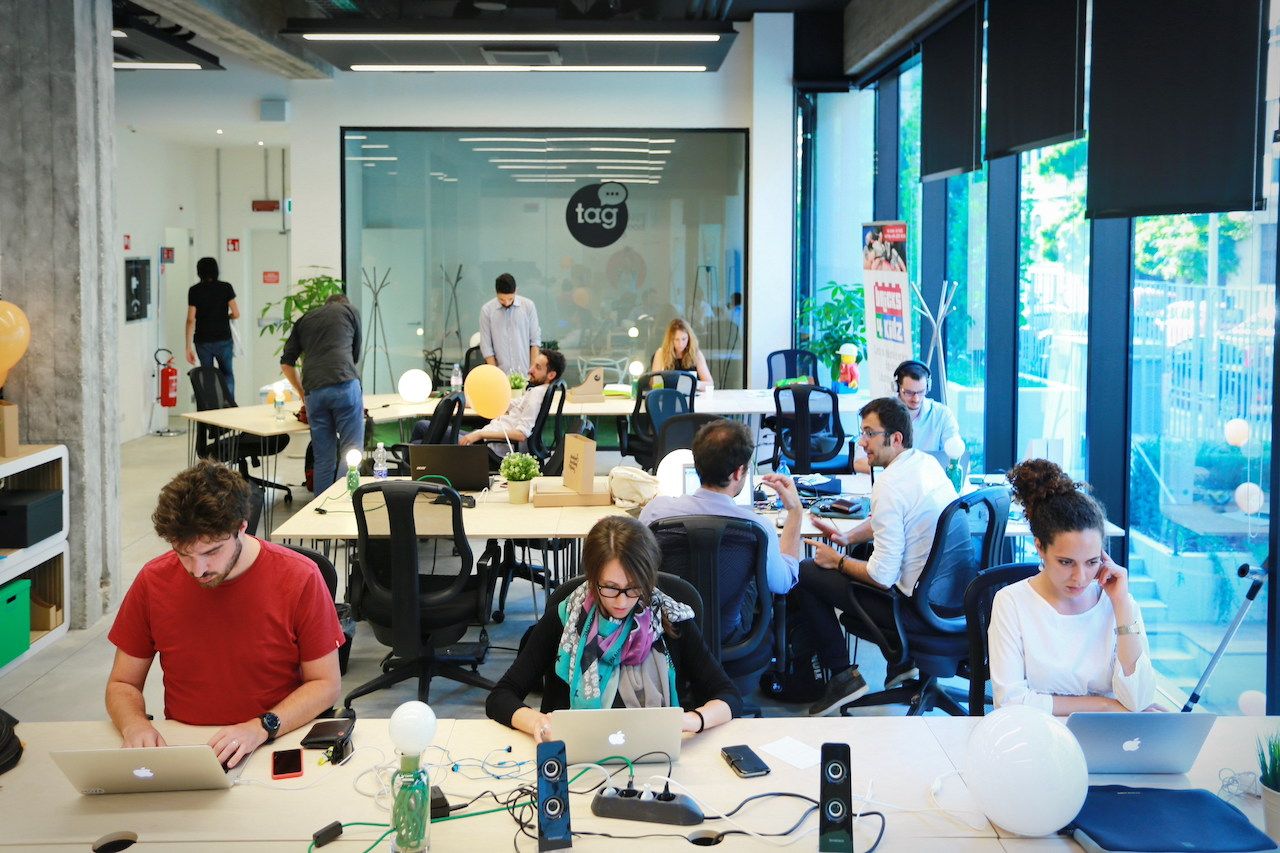At first glance, coworking spaces sound straightforward and uncontroversial. They’re essentially offices designed for remote workers, furnished with desks, Wi-Fi, receptionists, and sometimes even free refreshments. Remote workers from a variety of industries can rent these spaces on a daily, weekly, or monthly basis. Basically, it attempts to simulate a real office environment for people who aren’t actually required to work in an office.

Are Coworking Spaces Worth It or a Waste of Money?
The spaces can be a boon for an ever-growing number of workers who aren’t tied to a traditional office space. Some simply feel more productive in an office. Others might be attracted to the social dynamic, which you don’t get by working from your living room in your pajamas. As remote work itself rises in popularity, so too are coworking spaces in cities and countries around the world, from the United States to Bali, Indonesia. But are they a scam?
This seemingly simple concept is more complicated than it may appear. Sure, coworking spaces are versatile, but they’re also incredibly expensive for what you’re actually getting (a desk and some coffee, or beer on tap if you really splurge on a spot). For some, the cost is totally worth the professional atmosphere and social benefits. For others, the whole business model feels like a rip-off. To settle the debate, two members of the Matador Network team — senior staff writer Eben Diskin, who’s against coworking spaces, and editor Tim Wenger, who’s for them — squared off on the issue. Both work remotely and travel extensively, but take wildly different views on coworking spaces.
Against: Coworking spaces are a scam
Paying for a coworking space is like driving 10 minutes and paying 25 cents for a public restroom instead of just using the one in your apartment. Sure, it gets you out of the house. It’s a change of scenery. Maybe the public bathroom even has some fancy soap dispensers with that soft-foam stuff that smells like fresh mango. But the fact remains that you’re commuting and paying 25 cents for a service you can get for free without even getting dressed.
As a location-independent worker, I’ve considered coworking spaces on several occasions. Each time, I come to the same conclusion: They’re too expensive, aren’t conducive to productivity, and defeat the whole point of being a remote worker in the first place.
For: Coworking spaces are inspiring

Photo: Monkey Business Images/Shutterstock
Coworking isn’t for the glass-half-empty types who cast a questioning eye on the good nature of strangers and on even the slightest hint of change or progress. In short, coworking is not for pajama-clad living room warriors who prefer to keep the video off on Zoom calls and who don’t take advantage of their location independent privileges.
It’s instead for the big-picture thinkers who always know there’s a little bit more out there than what they’re currently getting. The modern world of work increasingly relies on contractors, small-time entrepreneurs, and freelancers to conduct tasks previously done in-house by staff at large companies.
Thing is, working on a contract basis can be isolating. Same goes for working for a remote company with team members distributed around the country or even the globe. Surrounding yourself with others in a similar situation can make all the difference in staying motivated. Without the established and visible corporate ladder to climb, it can often seem like you’re moving horizontally rather than vertically. Call me crazy, but I take a lot more inspiration from seeing other people kick ass at what they do than I do from secluding myself at home and getting FOMO from social media.
Against: It’s a glorified coffee shop
The only difference between a coworking space and a coffee shop is that coworking spaces smell like Febreze rather than french vanilla. Oh, and it costs about $200 more for a table. I certainly identify with the urge to get out of the house and work in a more public, social environment. That’s why I go to coffee shops. For $4.50 I can get a large coffee, blueberry muffin, Wi-Fi, and a “dedicated workstation” where I can sit until the place closes.
By contrast, one coworking space in my city charges $200 per month for a “shared desk,” $300 for your own personal desk, and offers private offices for up to $1,500 per month. That $1,500 can buy you approximately 600 blueberry muffins. I’ll let you decide where your money is better spent.
For: Coworking represents the future of smart city design
One of the primary arguments against coworking is the necessity to “drive to an office.” The people who make that argument sound like they’re stuck in the suburbs of the ’90s, when the slightest inkling of want required a 15-minute slog up a six-lane “neighborhood thoroughfare” to get to the nearest restaurant or strip mall. Depending on where you live, especially for people outside a city center, coworking may not be the most convenient option for you. Still, spaces are increasingly common in the suburbs and in smaller cities and towns.
The vision of the coworking space isn’t only about the coworking itself. It’s that it represents a small part of what modern urbanism should be. You shouldn’t have to drive 40 minutes in rush hour traffic from the suburbs to the city center to go to work, and I concede that doing that as a remote worker defeats the entire purpose of remote work. Instead, you should be able to walk — or better yet, hop on a bike or public transit — to a coworking space (or wherever you work) within a reasonable distance from your home, hotel, Airbnb, or — let’s dive off the deep end here — coliving space.
There is an undeniable sense of privilege in this. But the future of work will continue to move more careers to remote, which will likely drive market demand for close-to-home, flexible workspace options that include cafes and coworking. Even better if it’s all joined together along with other amenities like dining, nightlife, and outdoor recreation nearby. Progress is inevitable. You can spark a legal joint to that.
Against: The myth of productivity

Photo: MikeDotta/Shutterstock
In my opinion, the biggest misunderstanding about coworking spaces is that they’re a substitute for an authentic office environment. Coworking spaces are the dive bars of offices. Offices are often considered stale, uninspired workspaces, but they’re usually designed for productivity and the pursuit of a common goal. Coworking spaces might look flashier and come with free doughnuts, but by comparison, they’re an absolute free-for-all.
Unless you’re willing to fork over a good chunk of your income for a private room, you’ll find yourself at the mercy of an unpredictable cast of characters in a shared space. Listening to others’ phone calls will become a daily distraction. Instead of getting accustomed to your colleague’s obnoxious quirks, in coworking spaces you can look forward to a rotating door of “coworkers” with potentially annoying, inconsiderate habits. Sure, you might make some friends, but will you get anything done?
If only there was a public place furnished with plenty of desks that guaranteed absolute quiet. Oh yeah, they’re called libraries. And they’re free.
For: Nowhere offers better networking
Coworking memberships can often pay for themselves solely from the networking and professional development opportunities they offer. In 2017, I spent a month in Bali, working at Outpost Coworking, which is the best representation I’ve seen of the promise of coworking. Its locations are walkable or easily reachable via scooter in both Ubud and Canggu, and the space offers coliving options for travelers along with services like airport transfers. In addition to being an incredibly beautiful workspace, Outpost hosted nightly networking events featuring speakers touching on a wide range of topics related to remote work and the location independent lifestyle. These events provided a great way to meet the other people in the space, and often led to fun and engaging dinners at nearby restaurants afterward. One of the most useful aspects of coworking came as a result.
I landed a client — a business owner who needed content management — that turned into a long-term partnership and friendship in which we both benefited. As an added bonus, the revenue generated from that contract more than paid for my entire time in Bali, including flights to my next destination.
This is not uncommon. These spaces are typically populated by people who work in similar, but adjacent, fields. Web developers, copywriters, ad agencies, content marketers, and SEO whizzes are staples at most good coworking spots. They all need clients, and in turn, each other. When you’re a copywriter at a networking event, chatting with a woman who runs a content marketing agency and needs copy for an upcoming campaign, guess who she’s likely to hire?
Relationships like that don’t happen when you never leave your spare bedroom office. And they certainly don’t happen when you’re stuck on mute at the library.
Against: Coworking spaces squander the flexible benefits of being remote in the first place
Choosing to work from an office every day as a remote worker is like choosing to work at Dairy Queen after winning the lottery. The whole point of location independence is the freedom to work wherever you wish. That could be a coffee shop, your bed, a library, a park bench, or a bartop. The possibilities are endless. Choosing to wake up, get dressed, pack a bag, and drive to an office is like crawling back into the restrictive cocoon from which you worked so hard to break free.
Of course, the freedom of remote work comes with the freedom to work from a coworking space. There’s nothing wrong with revisiting the office life now and then — if only to remind yourself how much it sucks. Just don’t pretend it offers anything you can’t get at a coffee shop, allows for more productivity than a library, or is even remotely worth the exorbitant cost.
For: Coworking solves the “grown-up friendships” problem

Photo: Jono Erasmus/Shutterstock
We all know how hard it can be to make new friends in adulthood once the days of booze-fueled youthful revelry are behind us. Making friends in a traditional office or other workspace is totally doable, and very common. But in many cases, there are limits to “work friends” — primarily that once one of you moves on to another position or leaves the company entirely, the friendship slowly diminishes until all you have left is a Facebook connection and a warm memory of what once was.
In a coworking space, you’re constantly surrounded by people who are “at work,” just like you. Difference is, they don’t work with you. They aren’t your coworkers, and therefore your relationship isn’t based on workplace gossip and insider info. But they do share an understanding of remote work. They also spend their days staring at a laptop, probably working on tasks you’re familiar with and using lingo you understand. They’re also likely to be at the aforementioned networking events, ready to chill and have a conversation.
Beyond finding clients, it’s easy to make friends because the other people there are looking for non-work social connections. This is especially true in travel settings, where you and everyone else are away from home and existing social circles. In this way, your coworking membership serves as a built-in meet-up group for working professionals.
But hey, progress isn’t for everyone. Some people would rather stay home, which I’d argue is the real squandering of the location independent lifestyle. If you’re considering testing out coworking and all of this is not proof enough, catch me at the free happy hour this afternoon in the conference room and I’ll show you the photo collage I built of epic “dedicated workstation” views from around the world.